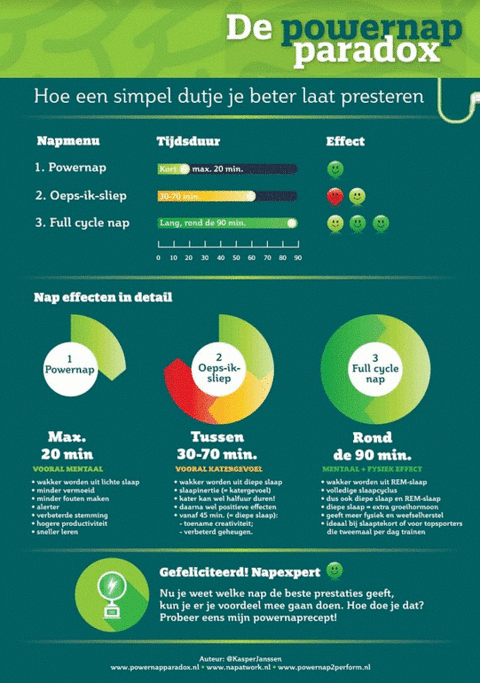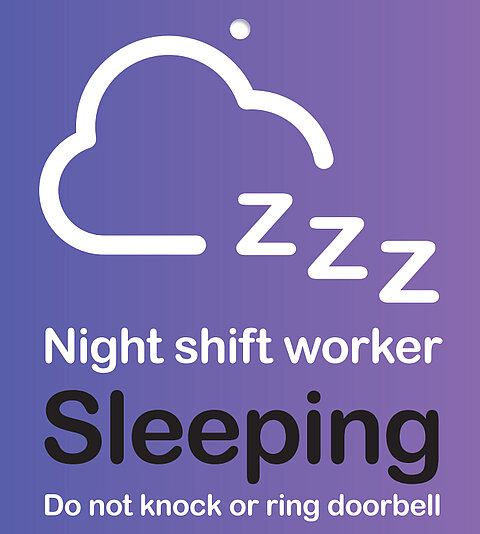Lifestyle interventions
A healthy lifestyle with attention to sleep, nutrition, exercise and relaxation helps to better deal with the physical and mental strain of night shifts. In this way, not only the care for others is maintained, but also the care for yourself.
Page content
Get enough sleep and recovery
If you work night shifts or on-call shifts, sleep is not a given. But getting enough sleep is essential for physical and mental recovery. Irregular working hours can disrupt the biorhythm considerably, making it extra important to pay attention to everything that comes with good sleep. This helps to improve sleep quality and reduce symptoms such as fatigue and irritability.
Practical recommendations for better sleep on night shifts:
- Keep a fixed sleep schedule, even on days off, to support your biological clock as much as possible.
- Make your sleeping environment as soothing as possible: use blackout curtains, an eye mask and earplugs to block out light and sound.
- Make sure you have a cool, well-ventilated room, ideally around 18 °C. Air conditioning or a fan can help with this.
- Avoid screens and blue light at least 30 minutes before bedtime. Put your phone on silent and put it out of reach.
- Let your body 'switch off' slowly. Take time to relax after your shift, for example with reading, quiet music or a hot shower and make it a habit.
- Limit caffeine in the last hours of your shift. Coffee can keep you alert at work, but avoid it in the hours (4-6 hours) before you go to bed.
- Only use sleep medication in consultation with a treating physician. Many sleeping pills cause reduced concentration, even hours after ingestion. In addition, the use leads to less restorative sleep and you run the risk of addiction. With long-term use, the medication works less and less well, causing people to use more or more often.
- Make use of facilities within your umc, such as power nap interventions, if they are available.
- Consult with your home front about your rest time. Good agreements and understanding from home make it easier to really recover.
By being mindful of sleep and developing good habits, you can limit the adverse effects of night work and continue to do your work with more energy and resilience.
Take a powernap
A powernap is a powerful way to boost your alertness and energy during night shifts.
- Keep your powernap short: aim for a maximum of 20 to 25 minutes of recovery. This prevents you from entering a deep sleep phase, which will actually make you wake up groggy.
- Plan your powernap strategically: The best time is halfway through your night shift, when your alertness is usually at its lowest.
- Create a quiet and dark environment near the ward: if possible, use blackout curtains, an eye mask and earplugs to block out light and sound.
- Set an alarm clock: make sure you wake up in time to finish your night shift sharply and not fall into your deep sleep.
- Relax consciously when you take a power nap: breathe in and out deeply, release tension, so that you can relax quickly.
- After your powernap: get up slowly, stretch for a while and drink a glass of water if necessary. Avoid strenuous activities right away to maintain the positive effect.
- Use powernaps as a supplement: see them as an extra tool to keep your energy up, but don't replace a good night's sleep with power naps.
- Make good agreements with your colleagues when it is best to plan a powernap and what to do in case of emergencies. Social support from your colleagues and manager is important to be able to take a powernap.

Eat and drink healthily
Night work not only disrupts the sleep rhythm, but also digestion and metabolism. By making conscious choices in what and when you eat, you can prevent fatigue, stomach upset and energy dips.
- Eat light and healthy during your night shift. Avoid heavy, high-fat meals; They are more difficult to digest at night. Instead, opt for light, high-fiber options like whole-grain crackers, yogurt, soup, or a salad.
- Have a nutritious meal before your night shift starts. This will give you a good foundation. For example, choose whole grain products, proteins (such as chicken, egg or legumes) and vegetables.
- Drink plenty of water. Night work can be dehydrating. Limit caffeinated beverages to the first half of your shift and avoid energy drinks.
- Use caffeine strategically. A cup of coffee at the beginning of your shift can increase your alertness, but avoid caffeine in the last 4-6 hours before going to bed.
- Bring healthy snacks. Think of fruit, unsalted nuts, snack vegetables, a boiled egg or a wholemeal sandwich. This will prevent you from reaching for sugary or fatty snacks.
- Eat at fixed times if possible. Try to maintain a regularity in breakfast, lunch and dinner during the day, so that your body stays in balance.
- Everyone is different. What works for one person may not always work for another. Experiment with what you eat and when, and listen carefully to your body.
- Be aware of the (unhealthy) team rituals. Ordering something together can be nice, but feel free to make your own, healthier, choice if that suits you better.

With the right food choices, you can concentrate better, keep your energy levels stable, and recover faster after a night shift. Small adjustments can make a big difference to your long-term health.
Exercise and play sports enough
Getting enough exercise helps to stay fit and energetic, even if you work night shifts. Regular exercise promotes circulation, reduces stress and supports your sleep quality. But with irregular working hours, it is sometimes difficult to find a good rhythm. With a few smart adjustments, you can still stay active, without overloading yourself.
Tips to keep moving during and around night shifts.
- Exercise regularly during your shift. Get up every now and then, take a short walk or do light stretches. Small moments of movement help to combat fatigue and stiffness.
- Plan your sports moments smartly around your shifts. Preferably exercise at times when it does not interfere with your recovery, such as before a night shift or on a day off.
- Choose something you like. Whether it's walking, dancing, swimming or cycling; Fun makes it easier for you to keep it up.
- Move together. A sports buddy helps you stay motivated and make exercise part of your routine.
- Preferably exercise during the day and outside. Daylight helps keep your biological clock in balance and supports a healthy sleep-wake rhythm.
- Combine endurance training with strength training. In this way, you work on both your fitness and your muscle strength, which contributes to a better load capacity in your work.
- Use umc facilities if there are any. Think of a gym, exercise programs or walking groups: exercising together is often more motivating.
Exercise does not have to be intensive or long to have an effect. Regularity, even in small portions, makes a big difference in how you feel, physically and mentally, during irregular shifts.
Relax to recover
Night work requires not only physical exertion, but also mental alertness and emotional resilience. That is precisely why relaxation is not a luxury, but a necessity. By consciously building in moments of rest, you give your body and mind the chance to recover.
Tips for more relaxation during night work in healthcare:
- Schedule moments of rest, also during your shift. A few minutes of conscious breathing, a short walk or a short power nap helps your brain to calm down.
- Actively relax after your night shift. A hot shower, quiet music, or a walk in the open air helps to release tension and get your body ready for sleep.
- Create a sleep ritual. Relaxation before bed improves your sleep quality. Think of a fixed ritual such as reading, stretching or breathing exercises.
- Limit overstimulation after work. Immediately after your shift, avoid busy screens, bright lights or exciting TV. Give your brain time to switch off.
- Provide mental space. Write your mind down in a journal or a note-taking app, especially if you're worrying or if things from your service keep haunting you.
- Practice relaxation techniques. Think of mindfulness, yoga, breathing exercises or progressive muscle relaxation. There are free apps and podcasts for this.
- Look for support in your environment. Talking to your colleagues, manager, friends or partner helps to process your experiences. Social support reduces stress.
- Make use of individual coaching or vitality programs from your umc.
- Be gentle with yourself. You don't always have to be 'on'. Recognize that you work night shifts and therefore need extra repair; That is not a weakness, but self-care.
Relaxation is not a waste of time, but fuel for recovery. By adding small moments of rest to your routine and consciously discharging, you have more energy left, for yourself and for others.
Balance work and private life

A good work-life balance is especially important if you work night shifts, as it can affect your social life, energy, and mental health.
Tips for a good work-life balance for night shifts:
- Communicate openly with your family and friends. Explain how your night shifts work, which times you need rest and when you are available. This is how you create understanding and space.
- Make clear agreements about rest and working hours. Plan your time off consciously and protect it from work-related obligations or unexpected calls.
- Really use your days off as days off. Take time to relax and do fun things that recharge you, even though you may feel tired or tempted to continue working.
- Plan social activities around your energy level. For example, a coffee moment or walk in the afternoon before your night shift, or a quiet meeting on your day off.
- Provide rituals to separate work and private life. Think of a short relaxation after your shift before you get home, or a fixed 'start and stop time' for work-related tasks.
- Look for signs of overload. Difficulty sleeping, irritability, or withdrawing from social contacts can be signs of a disturbed balance. Get help in time or discuss it with your manager.
- Seek support from colleagues. They understand the challenges of night work and can offer practical tips and emotional support.
- Be alert to the combination of irregular shifts and intensive care tasks at home. Where possible, ask for support from your environment and/or professional help. Regularly schedule a moment for yourself to recharge or consult with your manager about an adjusted schedule.
- Invest in yourself. Schedule regular time for hobbies, sports, or other activities that energize you and are separate from your work.
A conscious approach to your work-life balance helps you to work your night shifts with more energy and pleasure and to keep enough quality time for yourself and your loved ones.
Get Home Safely
Fatigue after a night shift can significantly reduce your reaction time and concentration, increasing the risk of an accident. The risk of a one-sided traffic accident is 2 to 4 times higher after a night shift.
Tips for safe commuting after a night shift:
- Avoid driving immediately after your night shift if possible. Consider alternatives such as cycling, public transport, carpooling with a colleague or having someone drive.
- Take a short powernap 10-20 minutes before your departure. This helps to temporarily improve your alertness.
- If possible, make use of available sleeping facilities immediately after a night shift.
- Take a coffee break before driving. Caffeine can increase your alertness, but avoid it right before bed.
- Be alert to signs of fatigue. If you notice yawning, your eyes getting heavy, or you have trouble concentrating, stop immediately and rest.
- Make sure there is plenty of fresh air in the car. Open a window or turn on the air conditioning to reduce fatigue.
- Avoid heavy meals just before your trip. A full stomach can increase drowsiness.
- Make sure you are well rested before your night shift. This reduces the risk of excessive fatigue afterwards.
Getting home safely is just as important as working well during your night shift. Take your rest seriously and choose the safest way to travel whenever possible.
